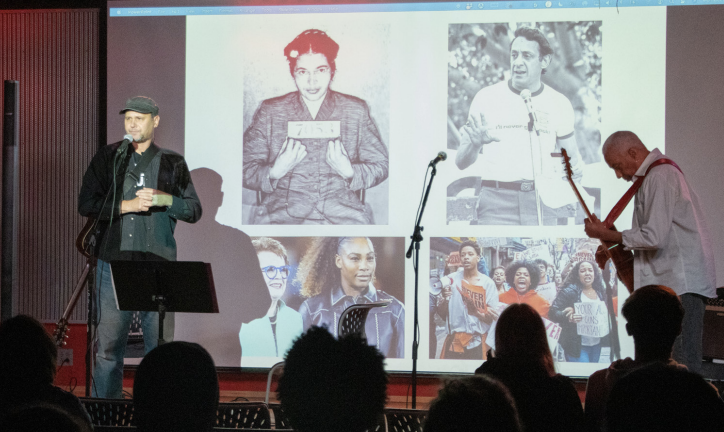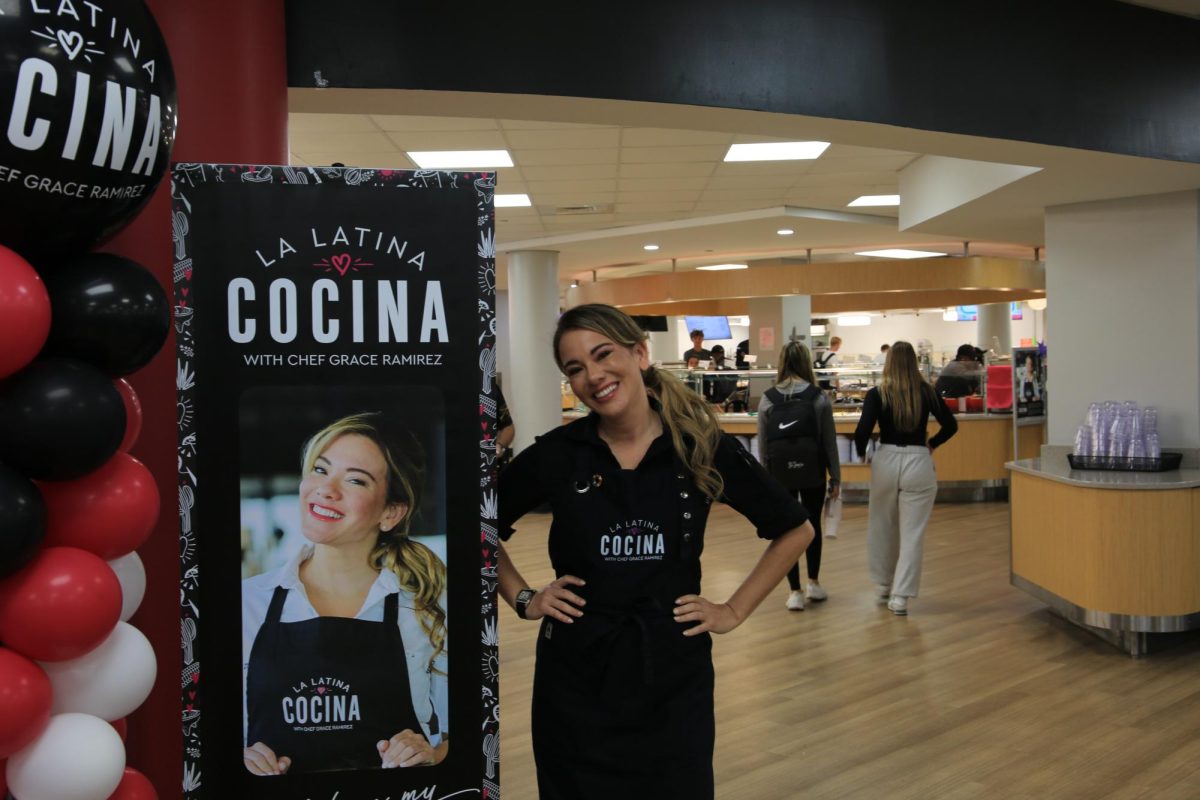The Beautiful Social Research Collaborative, a community-engaged writing program at St. Joe’s which partners with nonprofits and communities, sponsored “Race and Song: A Musical Conversation” at The Perch on Monday, Oct. 3. The department of communication and media studies, the department of sociology and the Center for Diversity and Inclusion (CID) also sponsored the event.
The performers, Reggie Harris and Alastair Moock, are friends of different races, ages and social backgrounds, and they explore issues of race, class, gender and history through music.
Harris is a musician, storyteller and educator who has been making folk music about civil and human rights for decades. Harris is also a descendant of the Great Migration, a mass movement from 1910 to 1970 where approximately six million Black Americans moved from the South to the Northern, Midwestern and Western parts of America. His ancestors fled Virginia and began a new life in Philadelphia, but found that the North was not rid of racism.
“The show is a conversation, it’s an opportunity, it’s a risk,” Harris said. “In this time of challenge and change, if we are to survive as a nation, if we are to survive the world, all of those things are important. We’ve got to find ways to talk to and listen to each other. I think one of the ways that has been proven to make that happen with more ease and more effectiveness is through music.”
Harris and Moock have been friends for over 25 years. Moock is a Grammy nominee who also established the Opening Doors Project, a small organization with a big mission to amplify voices of color and advance conversations about race through the arts.
“We had a very nice and polite and mutually respectful relationship and friendship, but we had never talked about race,” Moock said. “I didn’t know how to talk about race. Like most white Americans, I hadn’t been given the tools for that language. It was uncomfortable, and I worried about saying the wrong things.”
Moock reached out to Harris about collaborating on folk music which led to them having open and honest conversations about race. Moock expressed his gratitude for Harris’ engagement in racial conversations and described how it is exhausting for people of color, and particularly for Black Americans, to have these conversations so often with white Americans due to ignorance.
“I think it’s something that’s particularly hard for men because of whiteness and the elements of straight maleness together,” Moock said. “You get a person who society has taught to be emotionally guarded and that it’s very important to be right. You can’t do anti-racism work without learning how to be wrong.”
These conversations between Moock and Harris soon launched “Race and Song.”
“At some point, I said to Reggie, ‘I feel like the conversations we’re having here would be useful to put on stage, particularly in schools,’ ” Moock said. “We could bring in this conversation and wrap it around music.”
Moock and Harris both intended for the performance to be seamless and natural in its format.
“I like the spontaneity of launching a song and then launching a conversation and seeing where we go,” Harris said.
Harris revealed the difficulties of discussing such emotional topics and performing meaningful and historical songs on stage for an audience. His song “Hickory Hill” is especially heart-rending for him.
“Sometimes, when I’m singing the song ‘Hickory Hill’ and really thinking about what that story means and how it impacts not only me, but the history of this nation with that being a very common story of slavery, it creates a real emotional moment,” Harris said. “But I watch people in the audience sometimes cry or have visible reactions. I realized that the way we heal ourselves is to open ourselves to the stories of each other, and to the emotional, personal impact that our stories have.”
One of Moock’s favorite songs to perform is “Freight Train” by Elizabeth Cotten, a Black musician who wrote the song in 1905. The song was credited to two white British artists who misappropriated it as their own composition and got the copyright of the song. The copyright was eventually restored to Cotten, but still remains miscredited in many sources.
“We were able to unlock those conversations. It was like each song was its own little treasure,” Moock said. “As we talked about it with a lens about race in American history, it just brought us around to all of those subjects.”
Moock performed his own original song called “Be A Pain” on Monday night. The central message of the song lies in the chorus: “Don’t be polite, raise your voice and do what’s right.” The song references activists such as Rosa Parks, Harvey Milk, Billie Jean King and the Stoneman Douglas High School students who started the March for Our Lives.
Students in the class Popular Music, Protest and Social Justice, taught by Bill Wolff, associate professor of communications and digital media, have been working on the “Race and Song” event for the whole semester, according to Megan Gullotta ’23, a student in the class.
“It’s really nice to see it come to life, because we were doing the marketing materials and promotional items for it, and there was a team that was doing logistics and planning everything,” Gullotta said. “But I think it’s a really great opportunity to open doors for hard conversations through music, which is a very unifying force. And we got to spend some time with Reggie and Alastair and they were just so kind and such wonderful people.”
This was Harris and Moock’s first time performing “Race and Song” for a university. They plan to perform at other universities to spread the message of their performance.
“I am an eternal optimist in that I believe that music heals the world,” Harris said.















































